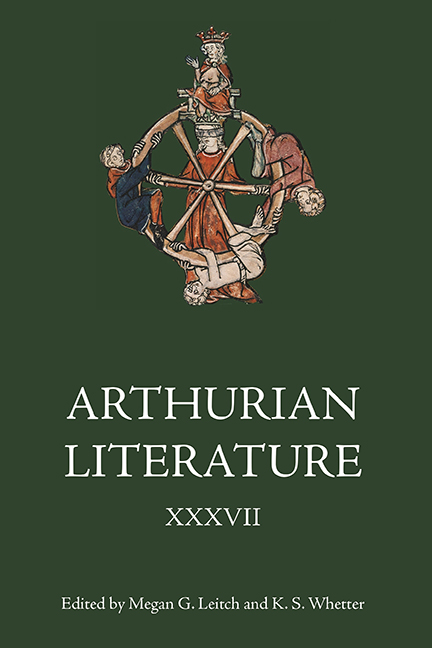Book contents
- Frontmatter
- Contents
- List of Charts and Tables
- Professor Fiona Tolhurst (1968–2021)
- General Editors’ Preface
- List of Contributors
- List of Abbreviations
- Introduction: The Tournament at Mapplemalleoré: Malory at 550
- 1 Malory and the Stock Phrase
- 2 The Artistry of Malory’s Mercantile Metaphors: Goods, Generosity, and the Source of ‘The Tale of Sir Gareth’
- 3 ‘A grete bourder and a passynge good knyght’: Sir Dinadan: ‘Gareth with a Twist’
- 4 Moonlight in the Nocturnal Typology of Malory’s Morte Darthur
- 5 ‘That shall nat ye know for me as at thys tyme’: Cognitive Narratology and Filling Malory’s Gaps
- 6 ‘On a tyme’: Action and Temporality in Malory’s ‘Sankgreal’
- 7 Hospitality in Malory
- 8 The Haunting of the Orkneys and Malory’s Arthurian Project
- 9 ‘I love nat to be constreyned to love’: Launcelot and Coerced Sex
- 10 Eradicating Victorian Backreading: Re-reading Malory’s Gwenyvere through Gaynour and Isode
- contents of previous volumes
General Editors’ Preface
Published online by Cambridge University Press: 15 September 2022
- Frontmatter
- Contents
- List of Charts and Tables
- Professor Fiona Tolhurst (1968–2021)
- General Editors’ Preface
- List of Contributors
- List of Abbreviations
- Introduction: The Tournament at Mapplemalleoré: Malory at 550
- 1 Malory and the Stock Phrase
- 2 The Artistry of Malory’s Mercantile Metaphors: Goods, Generosity, and the Source of ‘The Tale of Sir Gareth’
- 3 ‘A grete bourder and a passynge good knyght’: Sir Dinadan: ‘Gareth with a Twist’
- 4 Moonlight in the Nocturnal Typology of Malory’s Morte Darthur
- 5 ‘That shall nat ye know for me as at thys tyme’: Cognitive Narratology and Filling Malory’s Gaps
- 6 ‘On a tyme’: Action and Temporality in Malory’s ‘Sankgreal’
- 7 Hospitality in Malory
- 8 The Haunting of the Orkneys and Malory’s Arthurian Project
- 9 ‘I love nat to be constreyned to love’: Launcelot and Coerced Sex
- 10 Eradicating Victorian Backreading: Re-reading Malory’s Gwenyvere through Gaynour and Isode
- contents of previous volumes
Summary
Volume 37 of Arthurian Literature is one of the journal's special issues: in this case, a collection of articles emerging from the ‘Malory at 550: Old and New’ conference held from August 8-10 2019 at Acadia University. During the International Arthurian Congress in Würzburg (2017), Elizabeth Archibald suggested to Cory Rushton and Kevin Whetter that there should be a conference devoted to Malory: the eventual result of that conversation was the Malory conference of 2019. Even at the time, and especially now looking back to 2019 from our current perspective in the midst of the Covid-19 pandemic, the way in which ‘Malory at 550’ brought together established and emerging scholars from across the globe to focus on Sir Thomas Malory's Morte Darthur and its reception and influence has seemed a testament to the vitality and diversity of the field.
While all of the conference papers were of high quality and the editors would have wished to include many more if space had permitted, Arthurian Literature 37 coheres around selected papers from the conference that offer ground-breaking reappraisals of Malory's compositional habits and use of sources, and twenty-first-century reconsiderations of interpretive cruxes. Brief descriptions of the papers are offered by Cory James Rushton at the end of his Introduction to this special issue. It remains, though, to offer our gratitude to the people and financial support that helped make the conference a success. For financial assistance we are much indebted to the Social Sciences and Humanities Research Council of Canada, and to monetary and logistical support from both Acadia and St. Francis Xavier University, specifically Dr Wanda Campbell, Head of the Department of English and Theatre, Acadia University; Dr Cory James Rushton, Head of the English Department, Saint Francis Xavier University; Dr Jeffrey Hennessy and Dr Laura Robinson, former and current Dean of Arts, Acadia; Dr Heather Hemming, former Vice-President, Academic, Acadia; Dr Kevin B. Wamsley, Academic Vice-President and Provost, Saint Francis Xavier; and especially Dr Anna Redden, Dean of Research and Graduate Studies, Acadia. Most importantly, the conference ran smoothly thanks to the heroic efforts of our most worshipful team of assistants: Josh Foote, Amy Parkes, and especially Margaret Finlay.
- Type
- Chapter
- Information
- Arthurian Literature XXXVIIMalory at 550: Old and New, pp. ix - xPublisher: Boydell & BrewerPrint publication year: 2022

